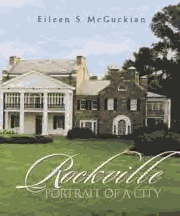
Rockville, Portrait of a City.
Hillsboro Press, Franklin, Tennessee, 2001.
Chapter 4, p. 45.
© City of Rockville
Local Historian
Account
An account by local historian, Eileen McGuckian.
 |
McGuckian, Eileen S. Rockville, Portrait of a City. Hillsboro Press, Franklin, Tennessee, 2001. Chapter 4, p. 45. © City of Rockville |
War and Reconciliation, 1860 - 1873
[Introduction]
On July 20, 1861, the sound of cannonfire startled Charles Abert at Homewood, his farm on the road from Rockville to Norbeck, now Manor Country Club. Abert, a Washington attorney and staunch Union man who attended many local political meetings with his friend, Judge Richard Johns Bowie of Glenview, and whose three brothers were officers in the U.S. Army, later learned that the noise came from across the river in Manasses at the first Battle of Bull Run. That day the first Rockville solider perished in the war. He was Levi Hoskinson, a nineteen-year-old apprentice printer at the Montgomery County Sentinel, who served the Confederate cause in the Seventh Virginia Infantry.
Rockville residents made painful choices in the early 1860s--a time of divisiveness, coexistence, and adjustment. They chose sides for philosophical, practical, political, economic, and family reasons. With blue and gray troops constantly moving through the county, the town could not escape the conflict. Rockville's role in the Civil War, while of limited national importance, greatly affected the lives of its citizens. Strong leadership from Rockville residents on both Confederate and Union sides, the town's relatively large population and its status as the county seat, and Rockville's strategic location in a slaveholding border state close to Washington made it a flashpoint of action and debate.
Rockville in the Civil War
In 1860 and 1861, as Americans debated whether or not to remain in the Union, Rockville residents were keenly aware that they lived in a state where slaveholding was a zealously protected right. although Rockville residents fought in the Northern and Southern armies and the town's noncombatants supported both sides, majority sentiment was clearly for the Confederate cause. Matthew Fields, editor of Rockville's weekly newspaper, was twice arrested for his anti-Union writings. Whenever rebel armies came to Rockville, they fully expected a welcome from the local populace.
Union strategists viewed Rockville--the largest settlement and the legal, political, economic, and geographic center of Montgomery County--as vital to Northern interests. It was close to Washington D.C. and to crossing of the Potomac River through which Confederate forces could attack. Maryland had to be kept in the fold, for the Federal capital could not afford to be surrounded by enemy territory. Rockville's location on the major road between Washington and the West was of strategic import for troop movements and territorial control. The town saw frequent skirmishes and occupation, as local residents contributed men. supplies, horses, food, and moral support to both South and North.
The conflict left Rockville depleted of livestock, in mourning for lost sons, and resolved to make the best of a changed economic, social and political situation. The upheaval caused by the Civil War and its aftermath influenced Rockville for decades. Those who experienced the was passed its memories on to their children.